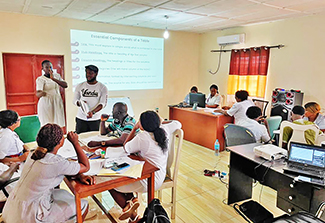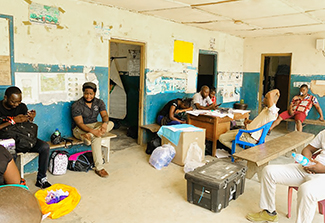Developing a new generation of researchers in Sierra Leone
July / August 2022 | Volume 21 Number 4
 Photo of courtesy of Dr. Robert Samuels
Dr. Robert Samuels (standing), a former PREVSL trainee , provides data training to healthcare workers in the pediatric ward at Kenema Government Hospital.
Photo of courtesy of Dr. Robert Samuels
Dr. Robert Samuels (standing), a former PREVSL trainee , provides data training to healthcare workers in the pediatric ward at Kenema Government Hospital.
Sierra Leone, with an estimated 134 doctors for almost 7 million people at the time, severely lacked the infrastructure needed to fight a deadly virus like Ebola in 2014. Nearly 4,000 died of the disease before the country was declared Ebola-free in November 2015.
Fogarty developed a targeted planning grant during that initial outbreak to encourage increasing scientific capacity in Liberia, Sierra Leone, and Guinea. That planning grant revealed that one of the most significant issues beyond the lack of physical infrastructure to do research in the region was the absence of trained researchers. Dr. Troy Moon, a professor of pediatrics in the Division of Infectious Diseases at Vanderbilt University Medical Center, is a principal investigator (PI) in the
Partnership for Research in Emerging Viral Infections-Sierra Leone, or PREVSL, program who has worked on capacity-building projects in Mozambique throughout much of his career. “The Ebola outbreak highlighted that Sierra Leone and much of West Africa had not benefited from the same health system strengthening activities that occurred in other African countries," he said. "We were starting from scratch in many ways."
The Fogarty-funded PREVSL program is a partnership between Tulane University, Vanderbilt University Medical Center, the University of Sierra Leone, and Kenema Government Hospital (KGH). The program aims to train a new generation of researchers in implementation science while strengthening clinical trial capacity. PREVSL also aims to advance clinical and translational research on delivering quality health services for endemic viral hemorrhagic fevers like Lassa fever while simultaneously building the knowledge and skills of trainees in-country to conduct higher-level clinical trial research during an epidemic like Ebola.
Dr. John S. Schieffelin, associate professor of pediatrics and medicine at Tulane University, is a co-PI on the project. He explains, “Programs like this are so important in a country where there just aren't enough doctors, even the ones who are interested in research have so much clinical work it's hard for them to find the time, and it's understandably not a priority."
So far, PREVSL has had two trainees, Dr. Foday Morovia and Dr. Robert Samuels, who has already received his master's in clinical investigations from Vanderbilt University School of Medicine along with a concurrent vaccine fellowship at the Vanderbilt Vaccine Research Program.
 Photo of Courtesy of Dr. Robert Samuels
Dr. Robert Samuels (second from left) meets with patients as part of his study on preexisting immunity in Ebola and Lassa Fever Survivors in Kono, Sierra Leone
Photo of Courtesy of Dr. Robert Samuels
Dr. Robert Samuels (second from left) meets with patients as part of his study on preexisting immunity in Ebola and Lassa Fever Survivors in Kono, Sierra Leone
Dr. Morovia is currently involved in a project studying how antibiotics were prescribed to patients co-infected with malaria and Ebola during the 2014-2016 outbreak. Dr. Samuels, a physician-scientist at the Kenema Government Hospital (KGH), has completed a study looking at the
prevalence of respiratory syncytial virus (RSV) and influenza in hospitalized infants and toddlers in Sierra Leone. He recently completed another study on preexisting humoral immunity to human coronaviruses and/or SARS-CoV-2. Dr. Samuels says one of PREVSL's biggest benefits was the mentorship. “Because of my mentors, I felt empowered to translate science, write proposals, and be an independent researcher."
As of 2018, Sierra Leone had almost 600 doctors, and its public health system has been bolstered by investment in the region. While this is a positive change in the healthcare workforce since 2014, there is still plenty of work to be done to serve the almost 8 million people living in the country today.
PREVSL has enrolled another student on track to start the degree portion of their training in late 2022, along with several new staff members. Incremental progress from programs like PREVSL moves the needle and gets other physicians in the region excited and interested in research that can have a long-term impact. Dr. Samuels remarked, “I implore young researchers to consider these viral hemorrhagic fevers like Ebola and Lassa fever so that we can build researchers in this area and strengthen our knowledge. These outbreaks mostly affect low-and-middle-income countries and can have devastating consequences."
More Information
Updated August 12, 2022
To view Adobe PDF files,
download current, free accessible plug-ins from Adobe's website.
Related Fogarty Programs
Related World Regions / Countries
Related Global Health Research Topics